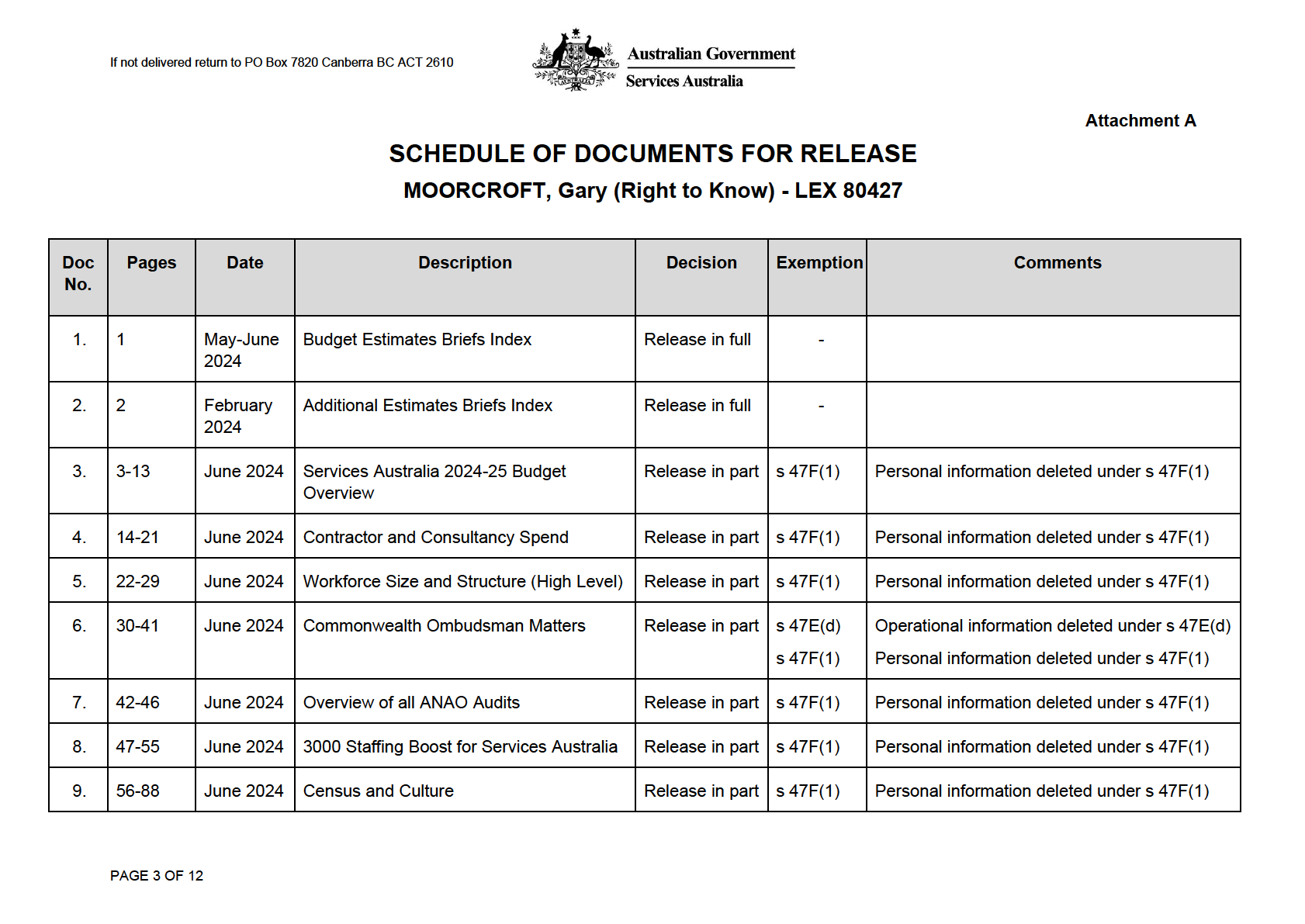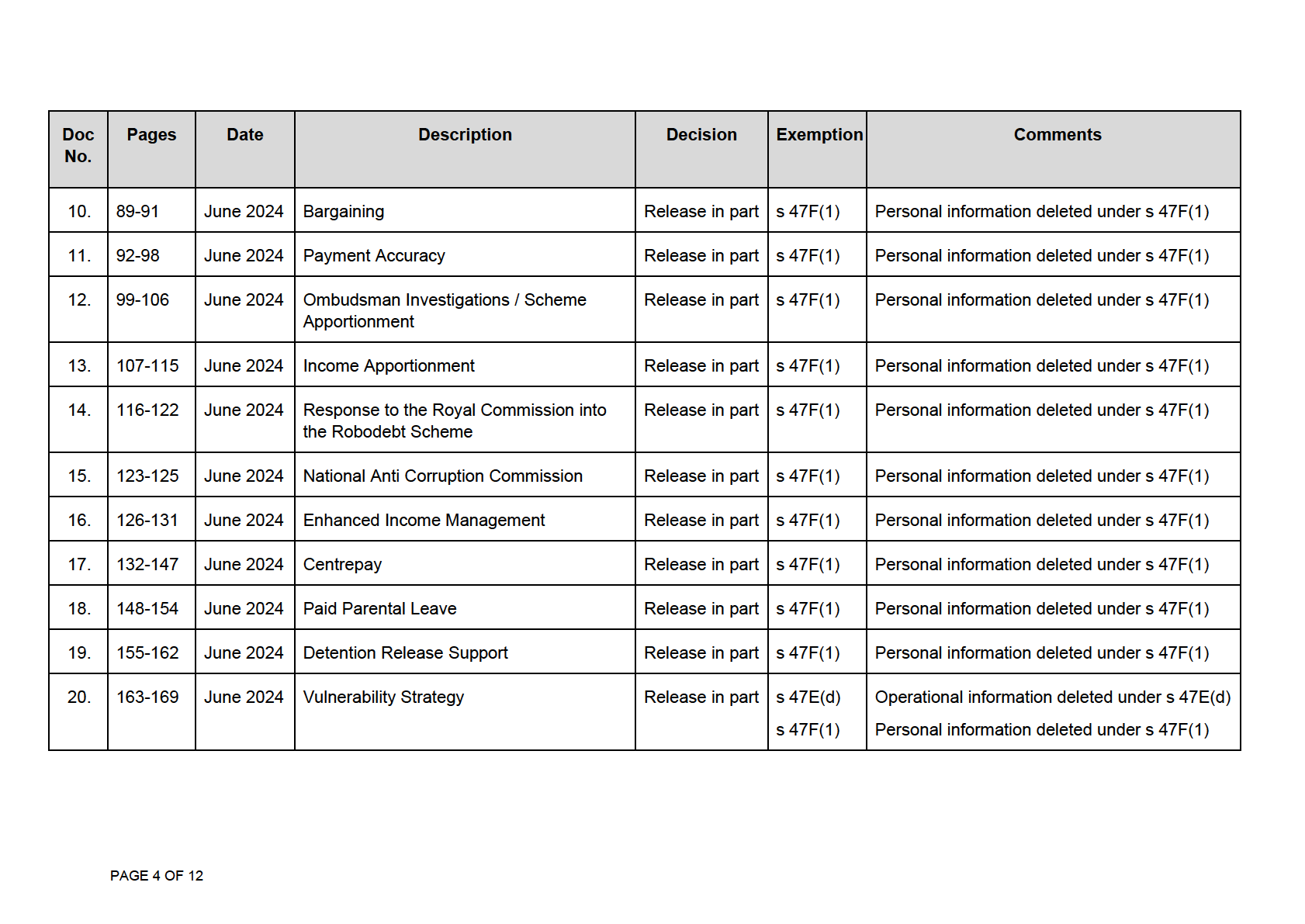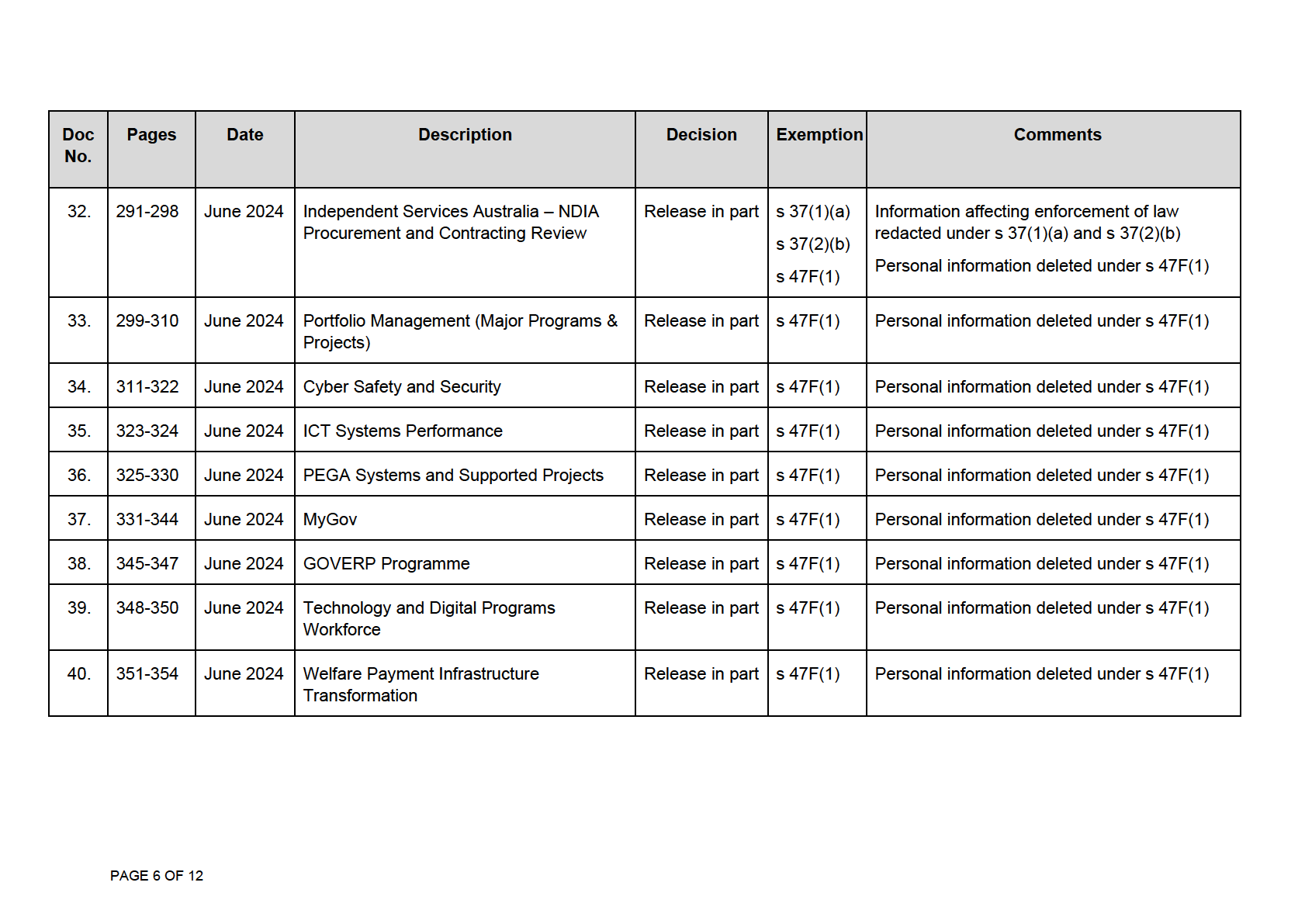
If not delivered return to PO Box 7820 Canberra BC ACT 2610
12 August 2024
Our reference: LEX 80427
Gary Moorcroft
(Right to Know)
Only by email: xxxxxxxxxxxxxxxxxxxxxxxxxx@xxxxxxxxxxx.xxx.xx
Dear Gary
Decision on your Freedom of Information Request
I refer to your request, dated and received by Services Australia (the Agency) on 2 July 2024
for access under the
Freedom of Information Act 1982 (the FOI Act) to the following
documents:
The latest Senate Estimates Briefing Packs prepared for the CEO of Services Australia
for his appearance at Senate Estimates on 3 June 2024.
My decision
The Agency holds 40 documents (totalling 354 pages) that relate to your request.
I have decided to:
• grant you
full access to 2 documents (Documents 1 and 2), and
• grant you
part access to 38 documents (Documents 3 - 40), with some of the content
removed.
I have decided certain parts of documents you have requested are exempt under the FOI Act
as they contain:
• information affecting the enforcement of law (section 37(1)(b) exemption and 37(2)(b)
exemption)
• information which if disclosed, would have a substantial adverse effect on the proper
and efficient conduct of the operations of an agency and release would be contrary to
the public interest (section 47E(d) exemption), and
• personal information about other people and release would be contrary to public
interest (section 47F(1) exemption).
Please see the schedule at
Attachment A to this letter for a detailed list of the documents and
the reasons for my decision, including the relevant sections of the FOI Act.
PAGE 1 OF 12
How we will send your documents to you
The documents are attached.
You can ask for a review of our decision
If you disagree with any part of the decision, you can ask for a review. There are two ways
you can do this. You can ask for an internal review from within the Agency, or an external
review by the Office of the Australian Information Commissioner. See
Attachment B for
more information about how to request a review.
Further assistance
If you have any questions, please email xxxxxxxxxxxxxxxxxxxx@xxxxxxxxxxxxxxxxx.xxx.xx
Yours sincerely
Cherie
Authorised FOI Decision Maker
Freedom of Information Team
FOI and Reviews Branch | Legal Services Division
Services Australia
PAGE 2 OF 12





If not delivered return to PO Box 7820 Canberra BC ACT 2610
REASONS FOR DECISION
What you requested
Under the Freedom of Information Act 1982 I seek the briefing pack prepared for the
CEO of Services Australia for the 2024-25 Budget Estimates hearings.
On 3 July 2024, I wrote to you about your original request. You revised your request and this
was confirmed by email on 8 July 2024.
Your revised request was:
The latest Senate Estimates Briefing Packs prepared for the CEO of Services Australia
for his appearance at Senate Estimates on 3 June 2024.
On 9 July 2024, the Agency acknowledged your request. You consented to exclude personal
details about our junior staff (such as their names) therefore, junior staff details have been
redacted in accordance with section 22(1) of the FOI Act.
On 25 July 2024, the Agency requested your agreement to a 11 day extension of time under
section 15AA of the FOI Act, and on 26 July 2024 you provided your agreement to this
additional time. The Office of the Australian Information Commissioner (OAIC) was notified of
the extension.
What I took into account
In reaching my decision I took into account:
• your original request dated 2 July 2024
• your revised request confirmed by you on 8 July 2024
• the documents which fall within the scope of your request
• whether the release of material is in the public interest
• consultations with Agency officers about:
o the nature of the documents
o the Agency's operating environment and functions
• guidelines issued by the Australian Information Commissioner under section 93A of
the FOI Act (the Guidelines), and
• the FOI Act.
Reasons for my decision
I am authorised to make decisions under section 23(1) of the FOI Act.
I have decided that parts of documents that you requested are exempt under the FOI Act.
My findings of fact and reasons for deciding that the exemption applies to those documents
are discussed below.
PAGE 7 OF 12
Documents affecting enforcement of law
I have applied the exemption in sections 37(1)(a) and 37(2)(b) to part of Document 32.
These sections of the FOI Act allow the Agency to exempt release of a document if disclosure
could reasonably be expected to prejudice the conduct of an investigation of a breach, or
possible breach, of a law or disclose lawful methods or procedures for preventing, detecting,
investigating, or dealing with matters arising out of breaches or evasions of the law.
Document 32 contains information relating to current Agency investigations into possible
breaches of a law and would disclose the lawful investigation methods of the Agency.
Paragraph 5.82 of the Guidelines provides that a document should have a connection with the
criminal law or the processes of upholding or enforcing civil law or administering a law, in order
to be exempt under section 37(1)(a) of the FOI Act. This is not confined to court action or court
processes but extends to the work of agencies in administering legislative schemes and
requirements, monitoring compliance, and investigating breaches.
I am satisfied that the release of the information would disclose methods and Agency
procedures for investigating breaches or possible breaches of the social security law and this
in turn would prejudice the effectiveness of these methods now and into the future.
Paragraph 5.108 of the Guidelines provides that the exemption under section 37(2)(b) of the
FOI Act requires that two factors are satisfied. There must be a reasonable expectation that a
document will disclose a method or procedure and a reasonable expectation or a real risk of
prejudice to the effectiveness of that investigative method or procedure. I consider there is a
reasonable expectation of serious prejudice to the effectiveness of these investigative methods
and procedures if the information were made publicly available. Release through FOI would
undermine the Agency's ability to detect, investigate and take action in response to potential
non-compliance with the social security law.
I am not suggesting you would misuse the information in anyway, however, the FOI Act does
not control or restrict use or dissemination of the information once released in response to an
FOI request. As such, I must consider actions any member of the public might take once the
information enters the public domain.
For the reasons set out above, I am satisfied that the information is exempt under sections
37(1)(a) and 37(2)(b) of the FOI Act.
Operations of the Agency
I have applied the exemption in section 47E(d) of the FOI Act to parts of Documents 6 and 20.
This section of the FOI Act allows the Agency to exempt a document from release if its
disclosure would have a substantial adverse effect on the Agency’s ability to conduct its
operations efficiently and properly.
Document 6 contains confidential material relating to an ongoing investigation, of which the
details are not publicly known. I consider that disclosure of this information could reasonably
be expected to undermine this investigative process, including reducing the willingness of all
parties to cooperate fully and frankly.
Document 20 contains internal information relating to the triaging of telephone enquiries by the
Interactive Voice Response system. The Agency’s purpose is to provide high-quality
government services and payments to Australians. It is a large organisation with established
processes and policies in place to ensure the effective management of its significant workload.
PAGE 8 OF 12
Disclosure of the above material would have a substantial and adverse effect on the Agency’s
proper and efficient conduct, as disclosure would undermine the Agency’s ability to ensure the
ongoing and effective delivery of the Agency’s operations in the manners outlined above.
While I have no reason to believe you would misuse the exempt material in this way, the FOI
Act does not control or restrict use or dissemination of the information once released, so I must
consider actions any member of the public might take if the information is in the public domain.
Public interest considerations
Access to conditionally exempt material must be given unless I am satisfied it would not be in
the public interest to do so.
I consider disclosure of the material would promote the objects of the FOI Act, including
increased public participation in Government processes, and increased recognition that
information held by the Government is to be managed for public purposes and is a national
resource. It may also promote effective oversight of public expenditure.
However, I consider that release of the exempt material in Document 6 would prejudice the
proper and efficient conduct of an ongoing investigation, the ability to obtain confidential
information, and the ability to obtain similar information in future.
I also consider that release of the exempt material in Document 20 would prejudice the
Agency’s ability to properly and efficiently deliver services to the public, by potentially enabling
individuals to circumvent elements of the Agency’s processes for their own advantage.
On balance and having weighed the factors in favour of disclosure against the factors against
disclosure, I find the public interest in disclosing the material is outweighed by the public
interest factors against disclosure.
For the reasons set out above, I am satisfied that the information is exempt under section
47E(d) of the FOI Act.
I have not taken into account any of the irrelevant factors set out in section 11B(4) of the FOI
Act in making this decision.
Unreasonable disclosure of personal information
I have applied the conditional exemption in section 47F(1) of the FOI Act to parts of Documents
3 to 40.
This section of the FOI Act allows the Agency to redact material from a document if its
disclosure would result in the unreasonable disclosure of personal information about other
people.
Personal information is information or an opinion about an identified individual, or an individual
who is reasonably identifiable. It can include, but is not limited to, a person's name, address,
telephone number, date of birth, medical records, bank account details, taxation information,
or signature.
I find Documents 3 – 40 contain personal information of third parties, being the names and
direct phone contact details of senior Agency employees and other third parties.
I am satisfied the disclosure of the personal information would be unreasonable, as you do not
have consent from these individuals for the release of their personal information. Further, I am
PAGE 9 OF 12
satisfied the information is private, not available publicly, and is not well known to you. I also
consider that revealing this information could reasonably be expected to expose the identified
third parties and staff members to contact outside reasonable working hours and may result in
harassment and/or threats from members of the public. I am not suggesting that you would
misuse the information in these documents, however the FOI Act does not control or restrict
use or dissemination of the information once released in response to an FOI request.
Public interest considerations
Access to conditionally exempt material must be given unless I am satisfied it would not be in
the public interest to do so.
When weighing up the public interest for and against disclosure under section 11A(5) of the
FOI Act, I have taken into account relevant factors in favour of disclosure. However, I have
also considered the relevant factors weighing against disclosure, indicating access would be
contrary to the public interest. In particular, I have considered the extent to which disclosure
could reasonably be expected to prejudice an individual's right to privacy and adversely affect
or harm the interests of a group of individuals.
Based on these factors I have decided that in this instance, the public interest in disclosing the
information in the above-mentioned document is outweighed by the public interest against
disclosure.
For the reasons set out above, I am satisfied that the information is exempt under section
47F(1) of the FOI Act.
I have not taken into account any of the irrelevant factors set out in section 11B(4) of the FOI
Act in making this decision.
As identified in the Schedule, I have redacted the exempt information in the documents and
released the remaining material in accordance with section 22(1) of the FOI Act.
PAGE 10 OF 12

If not delivered return to PO Box 7820 Canberra BC ACT 2610
Attachment B
INFORMATION ON RIGHTS OF REVIEW
FREEDOM OF INFORMATION ACT 1982
Asking for a full explanation of a Freedom of Information (FOI) decision
Before you ask for a formal review of a FOI decision, you can contact us to discuss your
request. We will explain the decision to you. This gives you a chance to correct
misunderstandings.
Asking for a formal review of a FOI decision
If you still believe a decision is incorrect, the
Freedom of Information Act 1982 (FOI Act)
gives you the right to apply for a review of the decision. Under sections 54 and 54L of the
FOI Act, you can apply for a review of an FOI decision by:
1. an Internal Review Officer in Services Australia (the Agency), and/or
2. the Australian Information Commissioner.
Applying for an internal review by an Internal Review Officer
If you apply for internal review, a different decision maker to the Agency delegate who made
the original decision will carry out the review. The Internal Review Officer will consider all
aspects of the original decision and decide whether it should change. An application for
internal review must be:
• made in writing
• made within 30 days of receiving this letter
• sent to the address at the top of the first page of this letter or by email to
xxxxxxxxxxxxxxxxxxxx@xxxxxxxxxxxxxxxxx.xxx.xx
Note: You do not need to fill in a form. However, it is a good idea to set out any relevant
submissions you would like the Internal Review Officer to further consider, and your reasons
for disagreeing with the decision.
Applying for external review by the Australian Information Commissioner
If you do not agree with the original decision or the internal review decision, you can ask the
Australian Information Commissioner to review the decision.
If you do not receive a decision from an Internal Review Officer in the Agency within 30 days
of applying, you can ask the Australian Information Commissioner for a review of the original
FOI decision.
You will have 60 days to apply in writing for a review by the Australian Information
Commissioner.
You can lodge your application:
Online:
www.oaic.gov.au
PAGE 11 OF 12
Post:
Australian Information Commissioner
GPO Box 5218
SYDNEY NSW 2001
Email:
xxxxxxxxx@xxxx.xxx.xx
Note: The Office of the Australian Information Commissioner generally prefers FOI
applicants to seek internal review before applying for external review by the Australian
Information Commissioner.
Important:
• If you are applying online, the application form the 'FOI Review Form' is available at
Information Commissioner Review Application form
• If you have one, you should include with your application a copy of the Agency's
decision on your FOI request
• Include your contact details
• Set out your reasons for objecting to the Agency's decision.
Complaints to the Australian Information Commissioner and Commonwealth
Ombudsman
Australian Information Commissioner
You may complain to the Australian Information Commissioner concerning action taken by
an agency in the exercise of powers or the performance of functions under the FOI Act,
There is no fee for making a complaint. A complaint to the Australian Information
Commissioner must be made in writing. The Australian Information Commissioner's contact
details are:
Telephone: 1300 363 992
Website: www.oaic.gov.au
Smart Form: FOI Complaint Form
Commonwealth Ombudsman
You may also complain to the Commonwealth Ombudsman concerning action taken by an
agency in the exercise of powers or the performance of functions under the FOI Act. There is
no fee for making a complaint. A complaint to the Commonwealth Ombudsman may be
made in person, by telephone or in writing. The Commonwealth Ombudsman's contact
details are:
Phone: 1300 362 072
Website: www.ombudsman.gov.au
The Commonwealth Ombudsman generally prefers applicants to seek review before
complaining about a decision.
PAGE 12 OF 12






